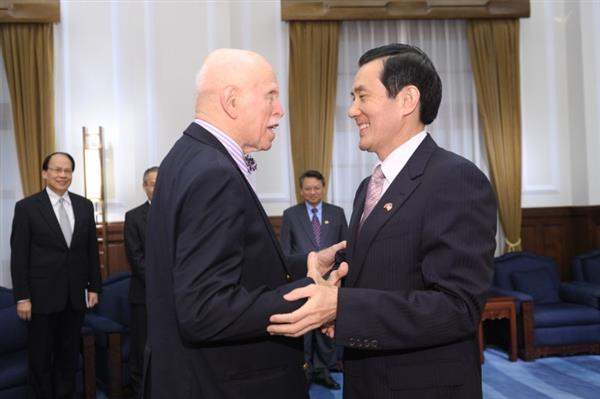News & activities
 News releases
News releases
President Ma Ying-jeou met on the afternoon of May 4 with Jerome A. Cohen, Professor at New York University School of Law and Co-director of the U.S.-Asia Law Institute. The president, on behalf of the government, expressed a cordial welcome to Professor Cohen. He also explained the ROC government's determination to maintain judicial impartiality and democratic rule of law, and efforts made to achieve it.
The president remarked that Professor Cohen is a leading authority in the United States on legal issues in mainland China, having published books dating back to 1968 on mainland Chinese criminal law procedure. At the time, he was one of only a handful of scholars doing in-depth empirical research on reform and re-education through labor in mainland China, the president said, adding that Professor Cohen's research has added immensely to understanding of mainland China. In 1974, Professor Cohen and Professor Hungdah Chiu (1936-2011) jointly wrote People's China and International Law: A Documentary Study, which was singled out by America's International Law Association for its excellence the same year. In addition, Professor Cohen was instrumental in training many scholars in mainland Chinese and Taiwanese legal issues when he served as Associate Dean of Harvard Law School and Director of the school's East Asian Legal Studies program. In recent years, Professor Cohen moved to New York University and established the U.S.-Asia Law Institute. President Ma remarked that Professor Cohen closely follows judicial systems on both sides of the Taiwan Strait and is particularly interested in criminal law procedures and human rights. He regularly expresses his opinions in Hong Kong's South China Morning Post, which are widely read.
President Ma commented that Professor Cohen's research into various issues is extremely in-depth. The president pointed out that when he served as Taipei City mayor, Professor Cohen visited Taiwan and toured the temporary detention space at the Da-an Police Station. The professor then offered suggestions on how to improve the space, which the president said demonstrates that Professor Cohen's concern for human rights comes from the heart, and transcends international borders and ideology.
The president noted that Ms. Yu-Jie Chen, a research fellow at the U.S.-Asia Law Institute, is presently studying implementation in Taiwan of the two international human rights covenants (the "International Covenant on Civil and Political Rights" and the "International Covenant on Economic, Social and Cultural Rights") that he signed two years ago. The president said that he has worked for many years to promote the signing and implementation of these two covenants. Since these two covenants cover such a wide scope, it will be difficult to complete the amendment of all related laws by the end of this year, he commented. Nonetheless, work done thus far is a start, and is bringing the protection of human rights and the rule of law here up to international standards, the president said.
President Ma added that Professor Cohen will have the opportunity on this trip to further understand recent conditions here. In addition, his visit will help to further strengthen contact between Taiwan and the United States. The president said that Professor Cohen's lectures at New York University related to judicial reform in Taiwan and democratic progress in Taiwan help to provide a correct understanding of the current state of Taiwan to interested persons.
Professor Cohen and Research Fellow Yu-Jie Chen were accompanied to the Presidential Office in the afternoon by Ministry of Foreign Affairs Secretary General Thomas T.S. Cheng to meet President Ma. Also attending the meeting was National Security Council Deputy Secretary-General Chih-kung Liu.



